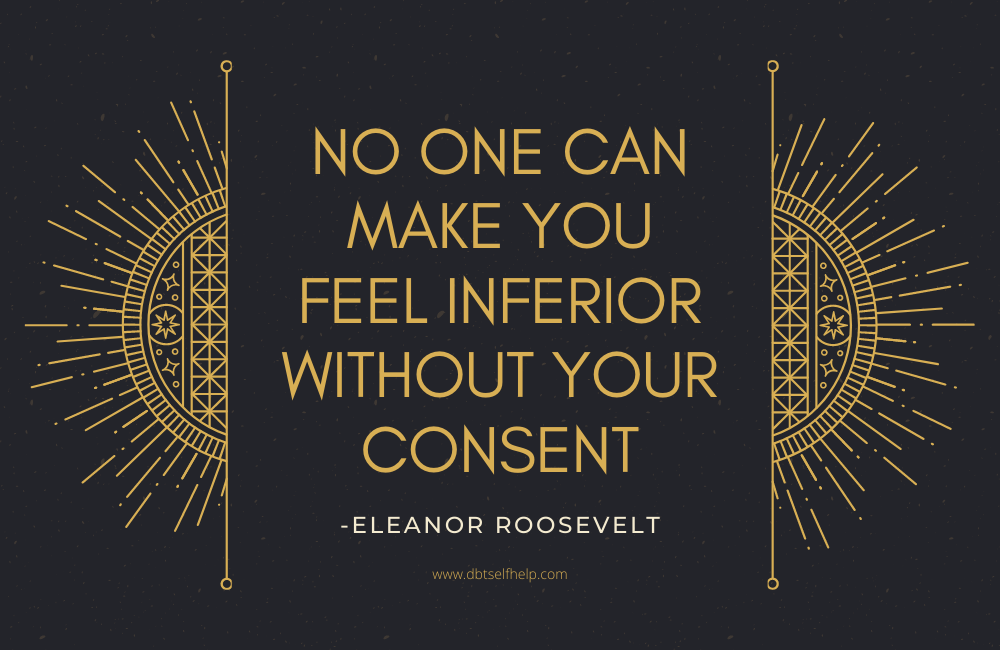
Dialectical Behavioral Therapy‘s Interpersonal Effectiveness skills are designed to help you get what you need from your relationships while being respectful of yourself and others. Interpersonal relationships can be very challenging when you are also dealing with unstable emotions. It’s all too easy to get lost in your emotions during an argument and bend to what the other person is saying unintentionally. FAST helps you maintain your respect for yourself during a discussion or argument. The acronym features four skills that teach you how to act in an argument in order to best get your objective met without sacrificing your own values.
- be Fair
- no Apologies
- Stick to values
- be Truthful
Much like GIVE, FAST educates you on how to have a discussion effectively while DEAR MAN helps you get an objective met.
No one can take away your self-respect unless you give it up. For a lot of people, self-respect is partially dependent on the quality of their relationships. Using Interpersonal Effectiveness skills will make you feel competent and effective because you are tending to your relationships in a skillful way.
Goals
It’s crucial to have a goal in mind before you begin your interpersonal interaction. This will help you remain clear and focused. The overarching goal of Self-Respect Effectiveness is to maintain your self-respect. This can be broken down further.
Self-Respect goals to consider:
- Act in a way that makes you feel moral, that respects your values and beliefs
- Act in a way that makes you feel capable and effective
- Act in a way that makes you like yourself

Be Fair
Be fair when you’re describing the situation and stating your objective. Consider the other person’s wants and needs along with your own. Avoid judgment and stick to the facts. Also be fair to yourself, don’t give in too soon or skew the facts to deprecate yourself.
No Apologies
Don’t apologize when you don’t have to. Asserting yourself and asking for what you need aren’t reasons to apologize. Neither is the way you feel or having a different point of view from the other person. It is okay to take up space. Only apologize when you have made a mistake or caused hurt.
Apologizing implies that you are in the wrong. Apologizing when you do not believe you are in the wrong will reduce your sense of effectiveness over time. It will minimize your own self-respect as well as get on others’ nerves.
Stick to Your Values
It’s scary to ask for change. It can feel like the other person might stop liking you if you do. This is most often not the case but it can be all too easy to be sucked into agreeing with something you don’t believe because of this fear. Make sure you confidently stick to your truth. Know what your values and morals are and don’t compromise them to avoid conflict or please the other person. Doing so will help you like yourself more over time.
Be Truthful
Avoid exaggerating. Stick to the facts, don’t stretch them. A pattern of dishonesty over time erodes your self-respect. Make sure not to make judgmental statements. If you do, just restate what you said with facts. Try not to act helpless when you are not, even if you are scared and insecure.
There are some instances where being truthful is actually destructive to the relationship. In these cases, you may want to skew the truth a little or tell a “little white lie.” You have to use your Wise Mind to guide you in deciding when this is appropriate.

Practice
It’s helpful to practice FAST when you’re not in an argument. Getting used to it and incorporating it into your life will help you use it when the situation gets more intense. Initiate small customer service interactions to practice FAST and other IE skills. Practice on trusted loved ones or a pet.

0 Comments